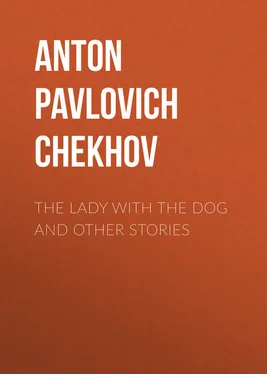Anton Chekhov - The Lady with the Dog and Other Stories
Здесь есть возможность читать онлайн «Anton Chekhov - The Lady with the Dog and Other Stories» — ознакомительный отрывок электронной книги совершенно бесплатно, а после прочтения отрывка купить полную версию. В некоторых случаях можно слушать аудио, скачать через торрент в формате fb2 и присутствует краткое содержание. Жанр: Старинная литература, Русская классическая проза, на английском языке. Описание произведения, (предисловие) а так же отзывы посетителей доступны на портале библиотеки ЛибКат.
- Название:The Lady with the Dog and Other Stories
- Автор:
- Жанр:
- Год:неизвестен
- ISBN:нет данных
- Рейтинг книги:3 / 5. Голосов: 1
-
Избранное:Добавить в избранное
- Отзывы:
-
Ваша оценка:
- 60
- 1
- 2
- 3
- 4
- 5
The Lady with the Dog and Other Stories: краткое содержание, описание и аннотация
Предлагаем к чтению аннотацию, описание, краткое содержание или предисловие (зависит от того, что написал сам автор книги «The Lady with the Dog and Other Stories»). Если вы не нашли необходимую информацию о книге — напишите в комментариях, мы постараемся отыскать её.
The Lady with the Dog and Other Stories — читать онлайн ознакомительный отрывок
Ниже представлен текст книги, разбитый по страницам. Система сохранения места последней прочитанной страницы, позволяет с удобством читать онлайн бесплатно книгу «The Lady with the Dog and Other Stories», без необходимости каждый раз заново искать на чём Вы остановились. Поставьте закладку, и сможете в любой момент перейти на страницу, на которой закончили чтение.
Интервал:
Закладка:
"Not badsome …" Ivan Petrovitch said softly.
And one of the visitors hearing, with his thoughts far away, said hardly audibly:
"Yes … truly…"
One hour passed, another. In the town gardens close by a band was playing and a chorus was singing. When Vera Iosifovna shut her manuscript book, the company was silent for five minutes, listening to "Lutchina" being sung by the chorus, and the song gave what was not in the novel and is in real life.
"Do you publish your stories in magazines?" Startsev asked Vera Iosifovna.
"No," she answered. "I never publish. I write it and put it away in my cupboard. Why publish?" she explained. "We have enough to live on."
And for some reason every one sighed.
"And now, Kitten, you play something," Ivan Petrovitch said to his daughter.
The lid of the piano was raised and the music lying ready was opened. Ekaterina Ivanovna sat down and banged on the piano with both hands, and then banged again with all her might, and then again and again; her shoulders and bosom shook. She obstinately banged on the same notes, and it sounded as if she would not leave off until she had hammered the keys into the piano. The drawing-room was filled with the din; everything was resounding; the floor, the ceiling, the furniture… Ekaterina Ivanovna was playing a difficult passage, interesting simply on account of its difficulty, long and monotonous, and Startsev, listening, pictured stones dropping down a steep hill and going on dropping, and he wished they would leave off dropping; and at the same time Ekaterina Ivanovna, rosy from the violent exercise, strong and vigorous, with a lock of hair falling over her forehead, attracted him very much. After the winter spent at Dyalizh among patients and peasants, to sit in a drawing-room, to watch this young, elegant, and, in all probability, pure creature, and to listen to these noisy, tedious but still cultured sounds, was so pleasant, so novel…
"Well, Kitten, you have played as never before," said Ivan Petrovitch, with tears in his eyes, when his daughter had finished and stood up. "Die, Denis; you won't write anything better."
All flocked round her, congratulated her, expressed astonishment, declared that it was long since they had heard such music, and she listened in silence with a faint smile, and her whole figure was expressive of triumph.
"Splendid, superb!"
"Splendid," said Startsev, too, carried away by the general enthusiasm. "Where have you studied?" he asked Ekaterina Ivanovna. "At the Conservatoire?"
"No, I am only preparing for the Conservatoire, and till now have been working with Madame Zavlovsky."
"Have you finished at the high school here?"
"Oh, no," Vera Iosifovna answered for her, "We have teachers for her at home; there might be bad influences at the high school or a boarding school, you know. While a young girl is growing up, she ought to be under no influence but her mother's."
"All the same, I'm going to the Conservatoire," said Ekaterina Ivanovna.
"No. Kitten loves her mamma. Kitten won't grieve papa and mamma."
"No, I'm going, I'm going," said Ekaterina Ivanovna, with playful caprice and stamping her foot.
And at supper it was Ivan Petrovitch who displayed his talents. Laughing only with his eyes, he told anecdotes, made epigrams, asked ridiculous riddles and answered them himself, talking the whole time in his extraordinary language, evolved in the course of prolonged practice in witticism and evidently now become a habit: "Badsome," "Hugeous," "Thank you most dumbly," and so on.
But that was not all. When the guests, replete and satisfied, trooped into the hall, looking for their coats and sticks, there bustled about them the footman Pavlusha, or, as he was called in the family, Pava – a lad of fourteen with shaven head and chubby cheeks.
"Come, Pava, perform!" Ivan Petrovitch said to him.
Pava struck an attitude, flung up his arm, and said in a tragic tone: "Unhappy woman, die!"
And every one roared with laughter.
"It's entertaining," thought Startsev, as he went out into the street.
He went to a restaurant and drank some beer, then set off to walk home to Dyalizh; he walked all the way singing:
"'Thy voice to me so languid and caressing…'"
On going to bed, he felt not the slightest fatigue after the six miles' walk. On the contrary, he felt as though he could with pleasure have walked another twenty.
"Not badsome," he thought, and laughed as he fell asleep.
II
Startsev kept meaning to go to the Turkins' again, but there was a great deal of work in the hospital, and he was unable to find free time. In this way more than a year passed in work and solitude. But one day a letter in a light blue envelope was brought him from the town.
Vera Iosifovna had been suffering for some time from migraine, but now since Kitten frightened her every day by saying that she was going away to the Conservatoire, the attacks began to be more frequent. All the doctors of the town had been at the Turkins'; at last it was the district doctor's turn. Vera Iosifovna wrote him a touching letter in which she begged him to come and relieve her sufferings. Startsev went, and after that he began to be often, very often at the Turkins'… He really did something for Vera Iosifovna, and she was already telling all her visitors that he was a wonderful and exceptional doctor. But it was not for the sake of her migraine that he visited the Turkins' now…
It was a holiday. Ekaterina Ivanovna finished her long, wearisome exercises on the piano. Then they sat a long time in the dining-room, drinking tea, and Ivan Petrovitch told some amusing story. Then there was a ring and he had to go into the hall to welcome a guest; Startsev took advantage of the momentary commotion, and whispered to Ekaterina Ivanovna in great agitation:
"For God's sake, I entreat you, don't torment me; let us go into the garden!"
She shrugged her shoulders, as though perplexed and not knowing what he wanted of her, but she got up and went.
"You play the piano for three or four hours," he said, following her; "then you sit with your mother, and there is no possibility of speaking to you. Give me a quarter of an hour at least, I beseech you."
Autumn was approaching, and it was quiet and melancholy in the old garden; the dark leaves lay thick in the walks. It was already beginning to get dark early.
"I haven't seen you for a whole week," Startsev went on, "and if you only knew what suffering it is! Let us sit down. Listen to me."
They had a favourite place in the garden; a seat under an old spreading maple. And now they sat down on this seat.
"What do you want?" said Ekaterina Ivanovna drily, in a matter-of-fact tone.
"I have not seen you for a whole week; I have not heard you for so long. I long passionately, I thirst for your voice. Speak."
She fascinated him by her freshness, the naïve expression of her eyes and cheeks. Even in the way her dress hung on her, he saw something extraordinarily charming, touching in its simplicity and naïve grace; and at the same time, in spite of this naïveté, she seemed to him intelligent and developed beyond her years. He could talk with her about literature, about art, about anything he liked; could complain to her of life, of people, though it sometimes happened in the middle of serious conversation she would laugh inappropriately or run away into the house. Like almost all girls of her neighbourhood, she had read a great deal (as a rule, people read very little in S – , and at the lending library they said if it were not for the girls and the young Jews, they might as well shut up the library). This afforded Startsev infinite delight; he used to ask her eagerly every time what she had been reading the last few days, and listened enthralled while she told him.
Читать дальшеИнтервал:
Закладка:
Похожие книги на «The Lady with the Dog and Other Stories»
Представляем Вашему вниманию похожие книги на «The Lady with the Dog and Other Stories» списком для выбора. Мы отобрали схожую по названию и смыслу литературу в надежде предоставить читателям больше вариантов отыскать новые, интересные, ещё непрочитанные произведения.
Обсуждение, отзывы о книге «The Lady with the Dog and Other Stories» и просто собственные мнения читателей. Оставьте ваши комментарии, напишите, что Вы думаете о произведении, его смысле или главных героях. Укажите что конкретно понравилось, а что нет, и почему Вы так считаете.












